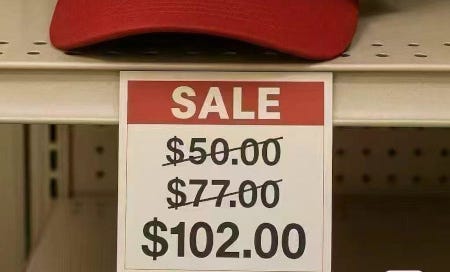Rob’s comments are in italics.
Derek’s comments are in normal font.
Well, it's been a pretty hectic week since Donald Trump announced his swinging tariffs on the rest of the world. Using this word tariff is a bit of obscurity. These things used to be called import duties. They're not paid by the foreign governments, which is the implication that he wants to convey. They're paid by anybody within the United States who's importing goods from any of these other places. So it's yet another tax. It does mean that all of the things which are imported are automatically going to be more expensive.
Probably anything that is made domestically will rise anyway as they'll have less price competition from the imports. We can expect healthy increase in inflation. We can expect the outgoings for the majority of the population to be increasing. Meanwhile, this is apparently coupled with yet more tax breaks for the extremely wealthy, which will give very little benefit to the rest of the population. The most common impression I get is that people are baffled by, as well as being alarmed, as well as being critical, they're baffled by Trump's behaviour. It seems that he's firing off policies without any due thought for the consequences. It's also extraordinarily inconsistent. For example, I thought it was a healthy development that he'd forced the Israelis to have a ceasefire a few months ago.
Of course, the Israelis were then routinely breaching that ceasefire. They've now abandoned the entire process towards negotiation, which appeared to have got started. To some people, this may not be a surprise. I don't know whether I'd describe it as a surprise or not, but it was certainly a disappointment to me. However, it does seem that Trump's enthralled to the Israeli lobby in the States and to a lot of significant donors to his campaign who are Israel supporters of one sort or another.
Yeah, you've only got to follow the money, I think, to discover that to be true.
The American taxpayers are continuing to fund the manufacture of arms which are being shipped to Israel. There's more saber rattling with Iran. I don't know whether they're loosening up for an actual attack on Iran, but it would not likely end well if they did.
The real disappointment to me is that I took at face value that he was intending to broker a peace deal in Ukraine. Having apparently made a start on that process, he's now been backing off from it. He's launching rhetorical attacks in public towards Russia in general and Putin in particular, which is not a way to conduct any sensible diplomacy. The effect of the imposition of the tariffs has been predictably that some of the other parties have responded by reciprocating the arrangement and putting tariffs on American goods. I think that if you look at the amount of trade, aside from weapons, the United States makes very little for export.
The export trade from the United States to China, for instance, is negligible. So how that's going to work out, we just don't know. Another thing is that the idea that this will force jobs to be created in America as all the manufacturing comes back home is definitely in the realms of fantasy. The American workforce hasn't got the skills to compete in the contemporary world. They haven't got the factories, they haven't got the equipment. It would take years, if not decades, rather than months to reverse that, if indeed it was a viable operation.
Things like automobiles, for example, having their final assembly at a plant in America, now contain components which come from all over the world. There appears to be no thought at all about the effect that has on the viability of those motor manufacturers. The thing I'd like to flag up is that we should perhaps take a step back and look at this within the context of two things which I said we'd be dealing with in the third section of the forthcoming book. That is the uniqueness of the present moment in history. One of them is, of course, the coming to an end of the American Empire. Just like every other empire, it goes through various stages. I think it's now further advanced on the downward slope and moving more rapidly than most people imagine.
Yeah, to quote Chris Hedges, Donald Trump is the symptom, not the cause of the current chaos.
Were you referring to Chris Hedges recent conversation with Richard Wolfe?
No, I've not watched that one yet. He's probably said the same thing a few times.
This is particularly about that aspect of it. One of the points that Richard Wolf makes is that in the latter days of an empire, the empire managers or rulers or elites seem to lose their minds. They do all manner of completely irrational things that are almost certain to be counterproductive. We can certainly see that at play.
The other thing as context for a wider view of these events that I think is important to bear in mind is that if you follow the models that were created by the Limits to Growth team, you'll see that we're still absolutely slavishly following what they called the Business as Usual Run or the Reference Run or the standard model. It was assumed that if policies are not changed in the light of this systems dynamic model, then certain things would happen. We would go into overshoot with industrial production, we'd go into overshoot with the global human population, we'd go into overshoot with the release of pollutants into the soil, the water and the air. This would result in a massive and traumatic correction sometime in the second quarter of the 21st century. All of those graphs have been remarkably on track now.
I would say that the critics of either the model or the team or the assumptions behind it have been thoroughly contradicted by the course of events. This year, depending, is either last year of the first quarter or the first year of the second quarter, depending on how you do your counting. Either way, we're going to be moving into that second quarter. Sometime within this, we're going to see drastic discontinuities. It's the refusal to face up to these discontinuities, which is the backdrop to all of the geopolitical events we see, the scramble for raw materials and remaining sites of mineral extraction, remaining sources of fossil fuels and the rest of it.
Yeah, it strikes me that the political controllers, let's say, have been hollowed out by corporatists' interests. That appears to be the root cause of it. Until we fix that, until that implodes or however that plays out. I don't know how else it runs.
So interesting times. Watch this space and stay safe as best you can.
Just going back to tariffs, I'd like to explore because presumably there is an argument for tariffs, but maybe in a more selective way that isn't on raw materials coming in and things that might be used for production in a factory in the United States or in a local country.
What almost every country has done as they develop economically and industrially is to protect their own internal industries by means of import duties on goods from elsewhere.
That still happens in the manufacturer of arms. It's a protected industry.
It is still a protected industry. I mean, it's funded by the government, which has got very deep pockets, especially as it's got unlimited powers of borrowing at the moment. It was very interesting comment by Richard Wolff in that conversation with Chris Hedges, where in contrast to what has often been said, it's often been said that America is trying to throw its weight around as though it was still the 1990s. This was no longer the case. China is in a totally different position from what it was in 1990s. So is India. For that matter, the Russia of today is not remotely resembling the Soviet Union.
People are still thinking of it with a stereotype of the Soviet era. There's definitely that blind spot in the American establishment as a whole. An interesting thing that Richard Wolfe said is that the world is not the same now as when Trump was last in office five years ago. That's how rapidly things have moved.
The most significant move really was that the United States inadvertently catalyzed the acceleration of Russia and China's moves to reduce their dependency on the American financial system, on the dollar as a reserve currency and of the Swift interbank currency movement system. I would have thought that in two or three years, a bunch of very smart people working very hard and basing what they do on what's already known could easily create a system that would do that job. I think the chances are that they've already done that. So that'll be something to watch out.
They're not yet talking about having a global gold based standard, but what they are doing is saying that they're creating bilateral agreements to trade in each other's native currency rather than in dollars. When they do that, there's got to be some balancing and clearing system, which is going to depend on gold. That is one of the reasons why central banks all around the world, whilst heavily denying it, have been building up their gold stocks.
Anyway, so interesting times. Watch this space and try and keep a focus on the fact that as the line in the Bob Dylan song, the wheel is still in spin, so don't speak too soon. We don't know how this is all going to work out. I still am absolutely convinced that it's within the bounds of possibility that we might be making a transition to a far more satisfactory world. That's the thing to keep an eye out for. See what signs you can see of that happening and see what you can do to slot into the unfolding new era that we're moving into.
Try to focus on the positive rather than the negative. It's very easy to fall into a negativity spiral in all independent media channels, often very focused on the downsides. I think we should be aware of the bad things that are going on, but keep an eye on what we can create and do want to create as well.
A very interesting book I'm reading this week is Dance to the Tune of Life by Denis Noble. It's primarily about biology and specifically about evolution and genetics and molecular biology. A key point that he makes there is that the attempts over the past hundred years have been to try and understand life by reductionist models. That is that you understand how things work at a finer and finer grain level until you get down to molecular biochemistry and then you say that explains everything else that happens. Whereas from a systems viewpoint, there obviously are phenomena at higher levels that can't be reduced.
An obvious analogy in the physical world is that in thermodynamics, you are considering large assemblies of molecules all moving at different speeds. The average energy of them gives you a measure of the temperature of that object. You don't need to track the trajectories of each one to have a model which operates at the level of macroscopic objects that is meaningless at the level of molecules. The same clearly applies to biological phenomena. The whole point is that there is definitely causation in the upwards direction from the molecules to the cells to the tissues to the organs to the organisms but there is also causation in the opposite direction.
Causation moves downward from the level of the organization which actually affects the way that the chemistry in your body works according to intentions that are created in your mind. The same thing applies obviously at the next level up when we're talking about entire societies or countries or governments or the global society. There are causation channels in both directions.
Thanks for listening to this episode of Sovereign Finance. For more episodes, transcripts, in-depth articles, and the community, please take a minute now to subscribe free using the button above. You’ll receive a free email notification whenever we publish a new article or conversation.















Share this post